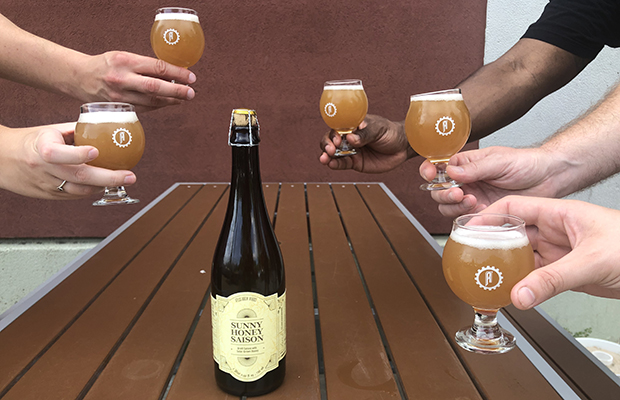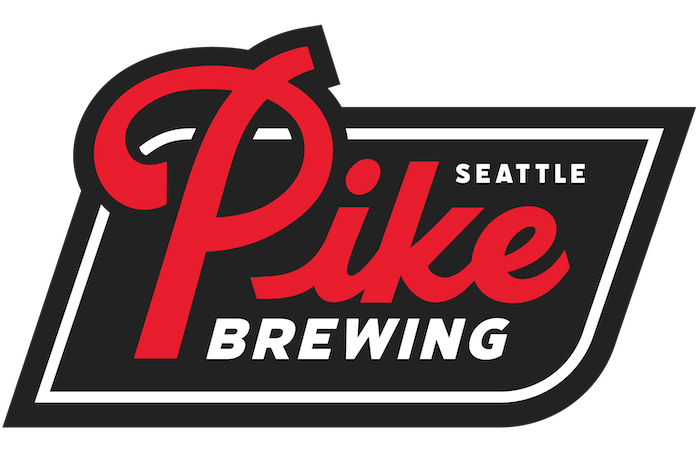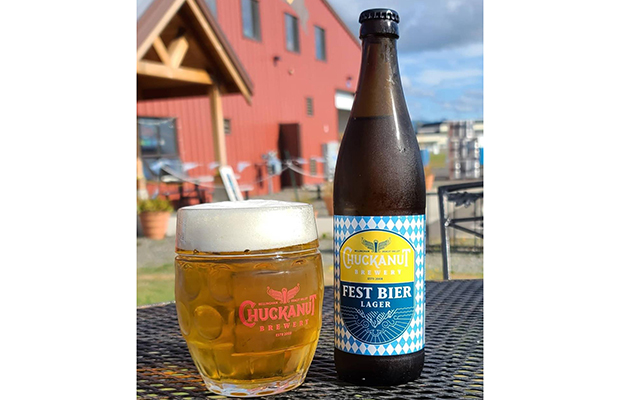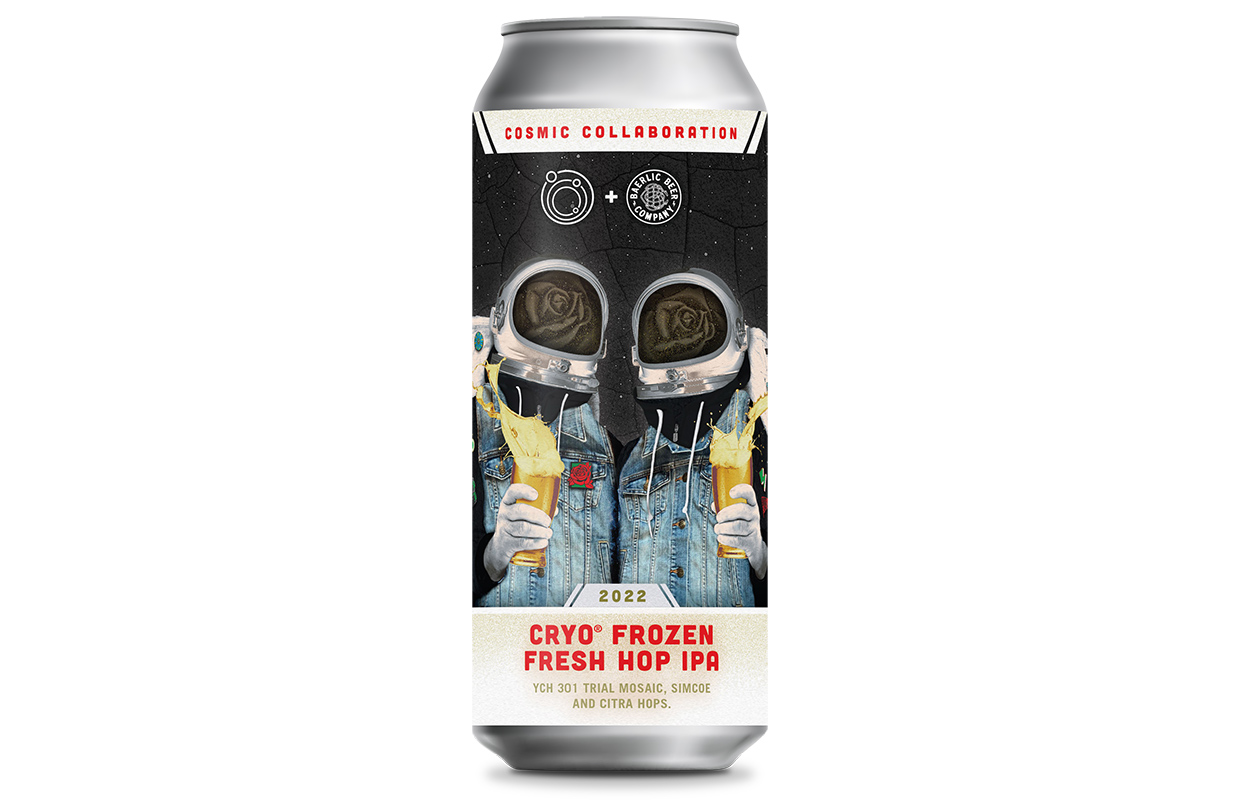
Atlas Brew Works today introduced Sunny Honey Saison, a collaborative beer made using honey harvested from solar farms that use pollinator-friendly plants as ground cover under and around the panels to help save the bees. Sunny Honey Saison, 7.3% ABV, 28 IBU, 3.0 SRM, 15.3*P OG, is available in limited edition 750 ml bottles at Atlas Brew Works taprooms in the District. This Brett Saison with Solar Grown Honey pours a soft, hazy orange color. Honeysuckle up front gives way to softer aromas of marshmallow, passionfruit, and beeswax. Solar Grown honey contributes honey flavors and a mild acidity. Atlas’ blend of yeast lends notes of white peach and apple.
“Particularly during National Honey Month, we’re excited to bring people together around solutions that can simultaneously address the challenges we face with preserving family farms, fighting climate change, and protecting pollinators,” said Atlas Brew Works Founder & CEO Justin Cox. “Combining 100% clean energy with Solar Grown honey and a supply chain that creates acres of flowering meadows is a delicious innovation we are excited to share with the residents of Washington D.C.”
Atlas Brew Works partnered with nonprofit Fresh Energy to provide the honey, which was harvested from hives on pollinator-friendly solar farms managed by Minnesota-based Bare Honey (BareHoney.com). Fresh Energy’s Center for Pollinators in Energy (BeesLoveSolar.org) is a resource for information and best practices in pollinator-friendly solar development. Pollinator-friendly solar is fast emerging as a national best practice for solar development on prime and arable farmland.
“As we scale up a clean energy transition, it’s exciting to see companies and communities proactively asking not just for clean energy, but also for stewardship of the land under and around the panels,” said Rob Davis, director of the Center for Pollinators in Energy at Fresh Energy. “Taprooms and beer bring people together—even in uncertain times—and what better way to celebrate National Honey Month than a beer that pairs clean energy with resilient landscapes to help save the bees and the planet.”
In addition to the Solar Grown honey coming from flowering solar farms in Minnesota, Atlas Brew Works is also donating 50 signed copies of a new children’s book, Bee Love (Can Be Hard), to DC public and charter schools. Written by Alan Page, former NFL Vikings defensive tackle, Minnesota Supreme Court Justice, and founder of the Page Education Foundation, with his daughter, the book tells the story of a boy visiting the honey bee apiary managed by a family friend, overcoming fear, and learning about the importance of bees.
Because solar is a new land use in many areas of the country, some people react with fear of the unknown when they learn a solar energy farm has been proposed for their county. Scientists predict farmers and other landowners will lease more than 2 million acres of land for photovoltaic solar projects by 2030—an increase from around 300,000 acres today. But these facilities are looking more and more like traditional farms every year. With support from the Solar Energy Technologies Office of the U.S. Department of Energy, scientists at the National Renewable Energy Laboratory are conducting research into “low-impact” solar development designs that provide dual-uses and co-benefits to agriculture and ecosystems. The NREL study, named InSPIRE, is also showing how low-impact solar designs can reduce costs and increase operating efficiency because of reduced mowing and creation of a cooler micro-climate under the panels. More than a dozen states have adopted land use standards to encourage pollinator-friendly ground cover under and around the panels on solar facilities ranging from a few to a few thousand acres. Hundreds of honey bee hives in the Midwest, Northwest, and Northeast forage for pollen and nectar on solar farms and thousands of sheep have already logged millions of “sheep hours” while rotationally grazing solar farms.
“Solar development approaches that use low-impact designs are showing promising results with regard to cost savings to the operator, and compatibility with agriculture and ecosystems,” said Jordan Macknick, lead energy/water/land analyst at the National Renewable Energy Laboratory and a Principal Investigator leading the InSPIRE study. “Pollinator-friendly solar and co-location with honey bee apiaries and grazing sheep is a solar development approach we’ve seen in a growing number of states.”
The Solar Grown honey for Sunny Honey Saison was sourced from Bare Honey apiaries on a pollinator friendly solar garden owned in partnership by the climate investment firm Hannon Armstrong and ENGIE North America Inc.’s Distributed Solar group. The Hannon Armstrong/ENGIE solar garden is on land leased from Minnesota farmers Larry and Jennifer Wagner-Lahr. Additional Solar Grown honey used by Atlas Brew Works was sourced from an electric co-operative solar farm owned by Connexus Energy.
More information about Bee Love (Can Be Hard) by Justice Alan Page and Kamie Page is available from the Page Education Foundation.
Photo courtesy Ather Ashan




Be the first to comment